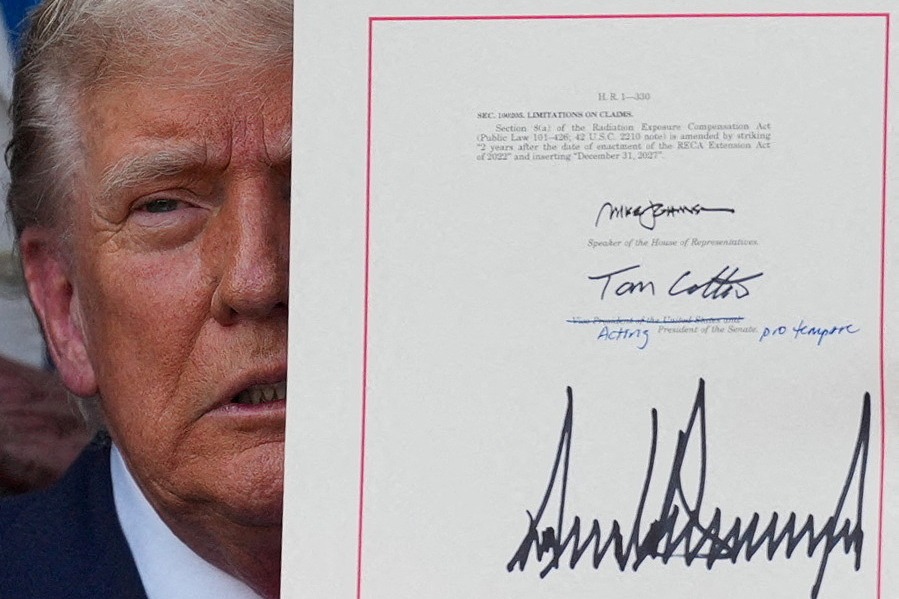Ecological vision aids global goals
China's experience offers developing countries viable green solutions

China's vision of harmony between humanity and nature not only serves the nation but also benefits the world, offering a new path for global sustainable development, experts said at a seminar on Sunday.
President Xi Jinping, then secretary of the Communist Party of China Zhejiang Provincial Committee, first proposed the concept that "lucid waters and lush mountains are invaluable assets" during an inspection in Anji county, Zhejiang province, on Aug 15,2005. The idea marked the start of a new chapter in China's pursuit of ecological conservation and green development.
"The ecological turn in Chinese-style modernization, guided by this concept for the past 20 years, corrects the past philosophical errors of the West," said Andrew Schwartz, vice-president of the Institute for Ecological Civilization in the United States.
He noted that the principle aligned with the traditional Chinese belief in the unity of heaven and humanity, and that modern development should coexist harmoniously with nature.
A new report, "Lucid Waters and Lush Mountains for Beautiful China and World: China's Ecological Civilization Concept and Practice, and How They Inspire the World", was jointly released at the seminar organized by the Xinhua Institute and the Research Center for Xi Jinping Thought on Ecological Civilization. It examined China's vision and practice of ecological civilization as well as its implications for the world.
Hu Jun, director of the research center, said the concept has addressed the long-standing global dilemma between development and environmental protection, breaking down the perceived divide between humanity and nature.
According to the report, since 2012, China's annual economic growth has averaged over 6.1 percent, supported by an average annual increase of 3.3 percent in energy consumption.
During the first four years of the 14th Five-Year Plan (2021-25), China's energy consumption per unit of GDP fell by 11.6 percent, equivalent to a reduction of 1.1 billion metric tons of carbon dioxide emissions, nearly half the European Union's total carbon emissions in 2024.
"The concept demonstrates that protecting and improving the ecological environment is, in essence, protecting and improving productive forces," Hu said.
Zhang Haibin, associate dean and professor at Peking University's School of International Studies, said: "China's approach offers both theoretical and practical guidance to the world, building on and innovating upon the international mainstream thinking on sustainable development."
"China's experience showed developing countries that it is possible to avoid the path taken by some developed nations — polluting first and cleaning up later," Zhang added.
The report noted that China has led the world in both photovoltaic and wind power installations, contributing over 45 percent of the global growth in non-fossil energy consumption. By the end of May, the country's installed capacity for renewable energy power generation had reached 2.09 billion kilowatts.
Over the past two decades, large-scale implementation of the "green is gold" philosophy has been carried out nationwide.
The principle has also played a key role in poverty alleviation. According to the report, new models such as eco-agriculture, ecotourism and eco-industrial development have helped lift 98.99 million rural residents out of poverty. China thus achieved the poverty alleviation goal outlined in the United Nations' 2030 Agenda for Sustainable Development a full decade ahead of schedule.
"Breaking the vicious cycle of poverty and environmental degradation is vital to the sustainable development of human civilization," said Zhang Yunfei, a researcher at the National Academy of Development and Strategy at Renmin University of China.
"China's model of ecological poverty alleviation has offered developing countries a new way to use green solutions to eradicate poverty," he said. "Transforming poor environments into lucid waters and lush mountains allowed them to become invaluable assets."
Experts also praised China's strong commitment to tackling climate change, noting its active participation in global initiatives such as the green Belt and Road Initiative, which reflects the core values of the concept. According to the report, China has partnered with over 100 countries and regions on green energy projects.
"Ecological civilization cannot be achieved by one nation alone. It requires unprecedented international cooperation," Schwartz said.

Today's Top News
- Gaza 'takeover' will ignite another horrific chapter for the Middle East: China Daily editorial
- STAR shines for innovative companies
- For a more inclusive global future
- Diplomatic solution for Ukraine crisis sought
- Consumption gains steam, drives growth
- Summit seen as chance to warm Sino-Indian ties






























